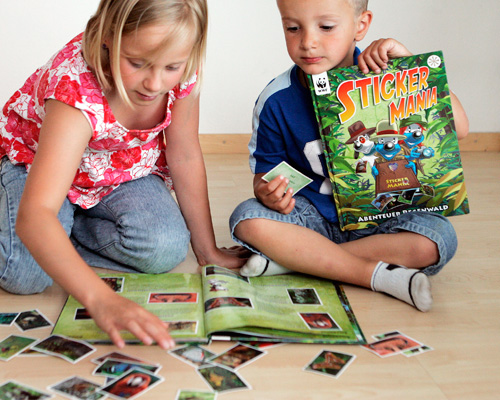Migros and the WWF: Tackling environmental challenges together
In 2009, Migros and the WWF took their decade-old relationship to a new level – with a strategic partnership.
Migros and the WWF: in 2009, this relationship already entered its 12th year. It began in 1998 when Migros became a founding member of the WWF Global Forest and Trade Network Switzerland (GFTN) (formerly the WWF Wood Group) in a bid to promote environmentally and socially sustainable forest management. The retailer went a step further in 2000 when it added the WWF's water-conserving AquaClics to its range. In 2001, Migros started sponsoring the WWF Pandamobil. The environmental organisation converted a Migros mobile shop into a travelling exhibition and classroom on wheels, which has since been on the road from school to school presenting a variety of themes to more than 5,000 children each year.
In 2007 Migros joined the WWF Climate Group, an association of climate-friendly firms, and at once went about redoubling its efforts in the area of climate protection. These include new buildings meeting the Minergie standard, the use of renewable energy, a wider range of energy-efficient appliances on offer and a label for climate-friendly products and energy-saving appliances. Since 2008, climate-friendly products have been labelled «approved by climatop» while energy-saving household appliances started carrying the «Topten» label in 2009.
Also in 2008, Migros and the WWF announced their cooperation in another area. Migros has become a member of the WWF Seafood Group and is the first retailer in Switzerland whose fresh-seafood department offers sustainable MSC fish bearing the Marine Stewardship Council (MSC) label, which designates saltwater fish from sustainable fishing.
In 2009 Migros and the WWF further strengthened their friendly ties. In April the retailer and the environmental organisation entered into a longer-term strategic partnership. In addition, Migros became the main sponsor of the WWF children's and youth programmes. «Stickermania – Abenteuer Regenwald» («The rain-forest - an adventure») marked the first campaign under the partnership. For each of the 605'000 copies of the rain-forest book sold, one franc went to a WWF rain-forest fund. The money is now being invested in setting up new nature reserves in the rain forests of Borneo and Madagascar.
In their strategic partnership, Migros and the WWF are close allies with significant leverage to bring about effective environmental action. They are preparing to work in closer coordination going forward, well beyond the children's and youth programmes. The two partners intend to define common focus areas and also issue joint communications. Together, they plan to have a positive impact on the environment while creating synergies between the two organisations. Migros should benefit from a transfer of the WWF's credibility and expertise in environmental issues, with a view to improving its product range and processes by a significant margin. In exchange, the WWF has a strong business partner to rely on for marketing environmentally responsible products.
The WWF echoes these sentiments. «To reach our environmental objectives, we must co-opt the market, and do so in a big way,» says Hans-Peter Fricker, CEO of WWF Switzerland. «We'll succeed only if the companies get on board.» Sometimes, they catch on rather quickly, actually. The MSC-Label is a case in point. For years the WWF appealed to its members to avoid sourcing endangered fish species, with little success. Until the WWF founded the Seafood Group, enabling it to work directly with companies to this day. These member firms include Migros which, by joining the Seafood Group, undertook to gradually switch its assortment to fish from sustainably managed stocks and environmentally responsible farms. Migros has also committed itself to refraining from selling endangered species of fish and to expanding its assortments of Bio-certified fish and seafood.
The WWF insists on member firms' tangible environmental actions in every area.
In addition to their active involvement in the GFTN, the Climate Group and the Seafood Group, Migros and the WWF have been championing the protection and promotion of biodiversity, as well the sustainable production of palm oil (with the Roundtable on Sustainable Palm Oil) and cotton (to the standard of the Better Cotton Initiative).
